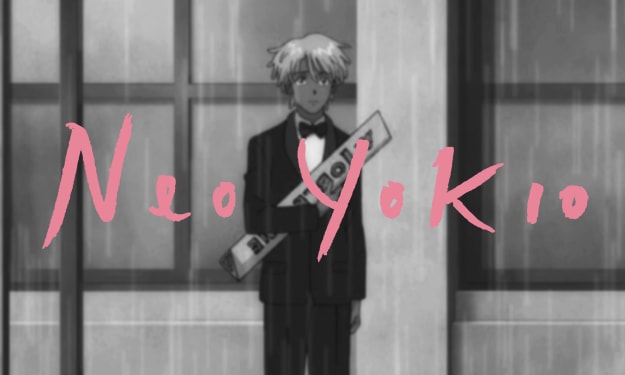This is the first video essay for this channel! Let me know what you think and if you’d like to see more of this stuff…
Anyone who’s a fan of Donald Glover knows most times, his work is shrouded in a lot of secrecy. This is actually one of the things I love most about him: he’s one of the few creators who can still keep us on our toes. His latest project, Guava Island, is no different. Other than a short trailer and some vague social media posts involving Rihanna, people didn’t know what to expect from this new collaboration. Then, only a week out from the event, Gambino and his team finally confirmed the project was dropping following his performance at Coachella. The musical-thriller follows in the footsteps of its predecessors, (think "Purple Rain," "Lemonade", and "Dirty Computer") and delivers us something that’s worth more than all the music festival hype and marketing stunts. It utilizes the medium to elevate what could be an hour-long vanity project, into an allegory about an artist’s function in modern society.
Folk Tales:
After multiple viewings of the film, I think the best way to approach Guava Island is to re-frame our thinking and expectations a bit. Meaning, we shouldn’t view this story as a traditional western narrative, but instead as a sort of modern myth or fable, with Deni (Gambino) assuming the role of a traditional folk hero. The world of Guava is even introduced to us by way of a bedtime story, delivered by Rihana’s Kofi. This seemingly-arbitrary style choice conveys a deeper truth about the message of this work.
“Folk narratives [within Black communities] form an orature category that are in large measure inherited from Africa.”
Cultures within the African-Diaspora have long preserved knowledge and values through oral traditions, such as music and story-telling. It’s no coincidence then, that this same literary technique is used in the opening of Black Panther. (In both sequences, we learn about the way the worlds are set up, through parents telling stories to their kids.) I think the strength of introducing the story this way is that it invites us to adopt the narrator's perspective. So keep in mind, when we see these scenes play out, we’re actually seeing them the way Kofi remembers it, or rather, the way she’s relating these scenes to the child. To me, this point is driven home by Director/DP duo, Hiro Murai and Christian Sprenger. At times, the camera feels like it’s floating. The low, wide angles and heavy film grain work together to create a feeling of nostalgia and timelessness.
Furthermore, Deni Maroon meets all the benchmarks of a typical folk hero: humble beginning, commits a deed of mythic proportions, and becomes a martyr in the face of injustice, while his story gets passed down to future generations. Side note: his last name, Maroon, is an allusion to the Jamaican Maroons; and a group of escaped slaves who found freedom in the mountains of the island. While the film is in no way subtle about its theme’s of social resistance, it’s important to think about how it’s being delivered to us. Almost every scene of this film contains an act of resistance or rebellion. Sure, you have the big moments like the concert and the funeral, but there are more subtle instances of it too. Consider the scene in the sweatshop when Letitia Wright’s character starts dancing as soon as the guard leaves the room, (which is also an awesome cameo by Sherrie Silver, the This is America choreographer), or the scene when Deni spends their break serenading Kofi with Summertime. Even love and leisure can be considered rebellious acts when committed in the face of authority, and it’s Deni’s music that serves as the soundtrack to this non-violent revolution. All things considered then, it’s not hard to see that Glover and his collaborators are weaving us a modern-day myth that reflects our anti-capitalist zeitgeist.
Imitation of Life:
By committing these acts of resistance, Deni and his fellow islanders are taking part in a rich tradition, one that has its roots in real people and events. Watching Guava, I couldn’t help but draw parallels to two real-life artists, in particular: Bob Marley and Nipsey Hussle. First, let’s talk about Bob: In 1976, Jamaica was a tense place. Two major political forces, PNP and the JLP, were vying for control and influence over the island. With the election approaching in the fall, waring gang factions committed political violence on behalf of the parties, and thanks to weapons smuggled in by the US—Jamaica was now a ticking time bomb. But Bob Marley had always viewed himself as a neutral force, aligning himself only with the Rastafari movement. At some point, he had the idea to put on a peace concert to unite the whole island, if only for a night, sound familiar? But when he approached the government (largely PNP at the time) about putting on the concert, strong arms working for JLP took this as a sign of political loyalty. Through no fault of his own, Marley's concert had been politicized by PNP candidate Michael Manley: Manley scheduled a last-minute election the day following the concert, hoping to capitalize on the turn-out. Two days prior to the event, JLP gunmen stormed Marley’s house and attempted an assassination on the musician. Bob went on to survive the attack and played the show anyway, drawing a crowd of thousands. It’s not hard to see why Marley comes to mind when watching this film, and I have no doubt that was writer Stephen Glover’s intent.
Fans were also quick to draw comparisons between Deni and recently deceased rapper, Nipsey Hussle. Hussle passed away on March 31st, 2019—long after this film had finished principal photography. He was extremely active in his community, investing in local business and youth programs, but he wasn’t shy about his prior gang affiliations. He used his perspective to launch his career, rapping about the things he had witnessed growing up. Nipsey was a folk hero in his own right, and Glover even made a statement about the artist’s passing at Coachella,
“...We lost Nipsey… What I'm starting to realize—all we really have is memories at the end of the day. That's all we are."
I think this mirrors the film’s perspective exactly. Deni wants to unite the citizen’s of the island for a brief moment, so they can at least have a memory of what it means to be free. Nipsey’s death sent waves throughout his community. Several of the gang leaders in LA called a truce on the day of his funeral. In an eerie similarity, Deni’s death is what leads to the islanders uniting and taking back their Sunday. Even the production design mirrors this theme of separated things becoming united. In the film, the use of red and blue denotes two separate worlds, dockworkers and seamstresses. But the gaps between these worlds is literally bridged by Deni, and we can see this represented in his outfit during the concert. Now while any connection between Nipsey’s passing and the plot of this film are merely coincidental; I think it’s fair to say both he and Deni share a similar perspective and function within their community.
The Artist and Society:
So, what is the function of an artist in a society that values monetary gain above all else—even us? Old pals Socrates and Plato recognized that art was powerful—powerful enough to “stir up” our emotions. It’s for this reason that they thought art should be censored, that average citizen should only be exposed to “good” art (stuff that promotes societies basic values), and “bad” art (anything deviant) should be thrown out all together. In their eyes, artists should strive to promote moral, law-abiding behavior with their work. But their argument operates on the basic assumption that the powers that run society are moral and just. What happens when the institutions that rule over our lives stop working in favor of us and in the favor of despots? Intellectual James Baldwin had this to say on the responsibility of the artist:
“The role of the artist is exactly the same as the role of the lover. If I love you, I have to make you conscious of the things you don’t see.”
Making us conscious seems to be Glover’s sole focus, second only to entertaining us. Early on in the film, Deni rants that, “Any place you have to make someone else richer in order to get rich, is America” before transitioning into a revamped performance of the popular song. This new context adds an entirely different meaning. Where the famous music video features gunshots prominently on the beat, the droning of machinery is now central to the music. Thanks to this remix, what was once a commentary on prevalent gun violence has become a broader critique of our work-obsessed culture “This is America.”
But much like the US government, red citizens are under constant surveillance. The production design adds to this sense of Orwellian paranoia: you can find eyes painted on the walls in various location throughout the movie. Also, it’s heavily implied Red’s tapping the phone. Deni freezes just when he’s about to say the lyric, “This is celly—that’s a tool,” because another dock worker threatens to get boss on the phone. Perhaps my favorite moment of the film though, Deni puts on a radio performance of "Feels like Summer" that gets the whole island to stop a listen for a second. This song has been getting a lot of play lately, thanks to another great music video. But I hadn’t really considered the meaning of the lyrics, until I heard them in this film. Glover sings a ghostly tune about climate change, authoritarian regimes, and mass extinction. Though it’s easy to get lost in the beautiful melody, you can’t hide from the perspective he presents us with—because it’s our perspective. Our society is facing some serious challenges, but so often it can feel like no one’s willing to grapple with these problems at an institutional level. I think that’s the benefit of being an artist and what makes art so dangerous for those in positions of authority; you don’t have to answer to anyone but yourself and your community at the end of the day.
I’ll admit, I may be biased in my critique. I’ve been following both Glover and Hiro Murai’s work for years. But there was a lot of hype surrounding this film, and fans (me included) have come to expect a lot from their projects. Despite all that, the team behind Guava Island has created something that still manages to exceed all expectations. It isn’t quite a short film, music video, or visual album. I’d consider it an experimental portrait of social resistance, and a handbook for any artist searching for their purpose.
About the Creator
intertext .
A series of essays analyzing the inspirations behind your favorite pop culture.






Comments
There are no comments for this story
Be the first to respond and start the conversation.